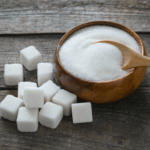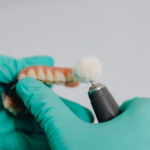How Your Diet Affects Dental Health
When it comes to maintaining a healthy smile, most people focus on brushing and flossing, but what you eat also plays a significant role in the health of your teeth and gums. Your diet not only affects your overall health but also has a direct impact on your dental health. In this blog post, we’ll explore the relationship between diet and dental health and provide tips for improving your oral hygiene through proper nutrition.
- Sugary Foods and Tooth Decay: Sugary foods and beverages are one of the primary culprits behind tooth decay. Bacteria in the mouth feed on sugars from foods like candies, sodas, and desserts, producing acids that erode tooth enamel and lead to cavities. Cutting back on sugary treats and opting for healthier alternatives can help protect your teeth from decay.
- Acidic Foods and Enamel Erosion: Acidic foods and drinks, such as citrus fruits, tomatoes, and carbonated beverages, can weaken tooth enamel over time, making it more susceptible to damage. Consuming acidic foods in moderation and rinsing your mouth with water afterward can help minimize the risk of enamel erosion.
- High-Fiber Foods for Gum Health: Foods high in fiber, such as fruits, vegetables, and whole grains, are not only good for your overall health but also promote gum health. Chewing fibrous foods stimulates saliva production, which helps neutralize acids in the mouth and wash away food particles, reducing the risk of gum disease.
- Calcium and Phosphorus for Strong Teeth: Calcium and phosphorus are essential minerals that play a crucial role in maintaining strong teeth and bones. Incorporating calcium-rich foods like dairy products, leafy greens, and almonds into your diet can help fortify tooth enamel and prevent tooth decay. Phosphorus-rich foods, such as meat, fish, and eggs, also support tooth mineralization and repair.
- Vitamin D for Oral Health: Vitamin D is necessary for calcium absorption and plays a key role in maintaining oral health. Adequate vitamin D levels have been linked to a lower risk of tooth decay and gum disease. Sources of vitamin D include fatty fish, egg yolks, fortified dairy products, and exposure to sunlight.
- Hydration and Saliva Production: Staying hydrated is essential for saliva production, which helps rinse away food particles, neutralize acids, and remineralize tooth enamel. Drinking water throughout the day, especially after meals and snacks, can help keep your mouth clean and protect against dental issues.
- The Importance of Balanced Nutrition: In addition to individual nutrients, maintaining a balanced diet rich in fruits, vegetables, lean proteins, and whole grains is key to overall dental health. Limiting sugary and acidic foods, practicing good oral hygiene habits, and visiting your dentist regularly for check-ups and cleanings are essential components of a comprehensive dental care routine.
What you eat can significantly impact the health of your teeth and gums. By making smart dietary choices, such as reducing sugar intake, consuming calcium-rich foods, and staying hydrated, you can support optimal dental health and enjoy a beautiful smile for years to come. Remember, a healthy mouth starts with a nutritious diet and good oral hygiene habits.








